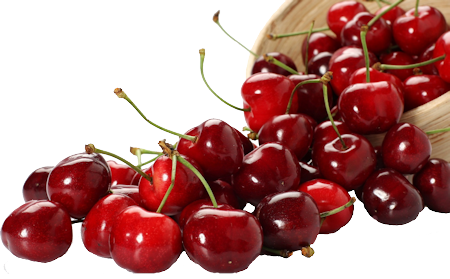|
They're a good source of vitamin C and fibre: A one-cup serving of
cherries contains 25 percent of your daily recommended amount of vitamin C and
over two grams of fibre.
They can improve brain function: If you make it a habit to snack on
tart cherries, you could be improving your brain in the long run. Research has shown that cherries can even reduce symptoms
of Alzheimer's disease and Huntington's disease.
They prevent muscle damage: Cherries reduce muscle soreness after a
workout, and they can prevent greater muscle damage in the long run. While sore
muscles are a sign of a good workout, it's never all that fun to deal with
painful steps on the stairs the next day. Cherries are chock full of
anthocyanins, powerful antioxidants that contain anti-inflammatory properties
and soothe aching muscles.
They fight cardiovascular disease: The potent anthocyanins, which
give cherries their ruby hue, can also have a positive effect on heart health.
University of Michigan Health system researchers found
that cherries can "alter factors linked to heart disease and
diabetes."
Antioxidant Protection: Cherries contain powerful
antioxidants like anthocyanins and cyanidin. One study found the antioxidant
activity of these substances isolated from tart cherries was superior to that
of vitamin E and comparable to commercially available antioxidant products.
Sweet cherries also contain a small amount of quercetin,
which is among the most potent in terms of antioxidant activity and a wide
range of other health-promoting properties.
Reduce Inflammation and Your Risk of Gout: In a study of
over 600 people with gout, those who ate only a ½-cup serving of cherries a
day, the equivalent of about 10 or 12 cherries, or consumed cherry extract, had
a 35 percent lower risk of a subsequent gout attack. Those who ate more
cherries, up to three servings in two days, had an even lower, 50 percent
reduction in risk.
Gout occurs when the metabolic processes that control the
amount of uric acid in your blood fail to do their job effectively. The
stiffness and swelling are a result of excess uric-acid-forming crystals in
your joints, and the pain associated with this condition is caused by your
body's inflammatory response to the crystals. Past studies have found:
Eating two servings of cherries after an overnight fast lead
to a 15 percent reduction in uric acid, and lower nitric oxide and C-reactive
protein levels (which are associated with inflammatory diseases like gout)
The researchers noted the study supports "the reputed
anti-gout efficacy of cherries" as well as "evidence that compounds
in cherries may inhibit inflammatory pathways."
Consuming tart cherry juice daily for four weeks may lower
your levels of uric acid
Support Healthy Sleep: (Melatonin) Cherries contain natural
melatonin, which is a powerful antioxidant and free radical scavenger that
helps "cool down" excess inflammation and associated oxidative
stress. It also plays a vital role in sleep and bodily regeneration.
Based on daily environmental signals of light and darkness,
your pineal gland has evolved to produce and secrete melatonin to help you
sleep. Research suggests that consuming tart cherry juice not only help
increase your melatonin levels but may also improve time in bed, total sleep
time and sleep efficiency.
Consumption of a tart cherry juice concentrate provides an
increase in exogenous melatonin that is beneficial in improving sleep duration
and quality in healthy men and women and might be of benefit in managing
disturbed sleep."
Arthritis Pain Relief: Cherries contain many
anti-inflammatory compounds, and research suggests they may help to relieve
pain from inflammatory osteoarthritis.
According to one study, women with osteoarthritis who drank
tart cherry juice twice daily for three weeks had significant reductions in
markers of inflammation. They also had a 20 percent reduction in pain. The
researchers noted that tart cherries have the "highest anti-inflammatory
content of any food."
Reduce Belly Fat: In an animal study, rats fed tart cherry
powder along with a high-fat diet gained less weight and built up less body fat
than rats not fed tart cherries. They also had lower levels of inflammation and
triglycerides, suggested a potential role in heart health.
Reduce Post-Exercise Muscle Pain: Athletes who consumed tart
cherry juice prior to long-distance running experienced less pain than those
who did not. It's thought that the antioxidant and anti-inflammatory properties
of tart cherries may have a protective effect to reduce muscle damage and pain
during strenuous exercise.
Lower Risk of Stroke: Consuming tart cherries may activate
PPAR (peroxisome proliferator activating receptors) in your body's tissues,
which help regulate genes involved in fat and glucose metabolism. This
activation may help to lower your risk of heart disease, and research suggests
eating cherries may provide similar heart benefits to prescription drugs called
PPAR agonists.
|

